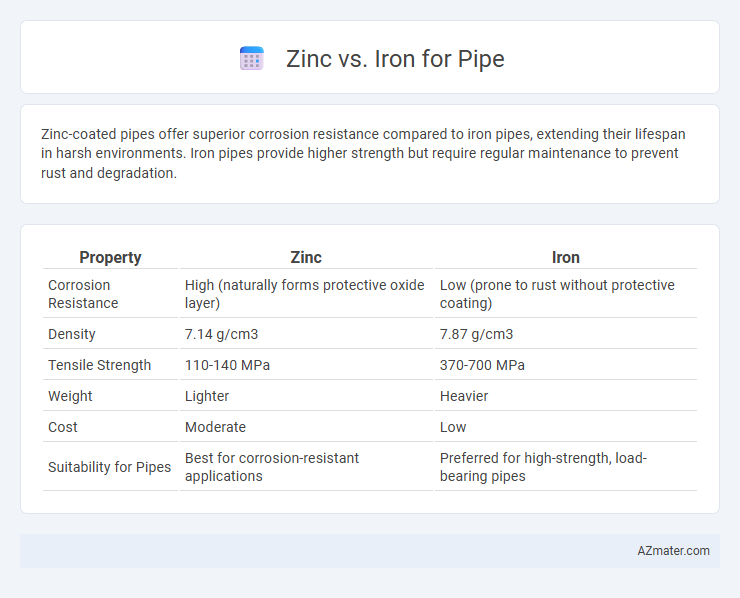Zinc-coated pipes offer superior corrosion resistance compared to iron pipes, extending their lifespan in harsh environments. Iron pipes provide higher strength but require regular maintenance to prevent rust and degradation.
Table of Comparison
| Property | Zinc | Iron |
|---|---|---|
| Corrosion Resistance | High (naturally forms protective oxide layer) | Low (prone to rust without protective coating) |
| Density | 7.14 g/cm3 | 7.87 g/cm3 |
| Tensile Strength | 110-140 MPa | 370-700 MPa |
| Weight | Lighter | Heavier |
| Cost | Moderate | Low |
| Suitability for Pipes | Best for corrosion-resistant applications | Preferred for high-strength, load-bearing pipes |
Introduction: The Role of Metals in Piping Systems
Zinc and iron play crucial roles in piping systems by providing strength and corrosion resistance essential for durable infrastructure. Iron, commonly used in cast and ductile forms, offers high tensile strength but requires protective coatings to prevent rust. Zinc is primarily utilized as a protective galvanizing layer on iron pipes, significantly enhancing lifespan by inhibiting oxidation and reducing maintenance costs.
Key Properties of Zinc and Iron
Zinc offers excellent corrosion resistance due to its self-healing oxide layer, making it ideal for outdoor and moist environments, while iron provides superior strength and durability, supporting heavy load-bearing applications. Zinc's relatively low melting point enables easier casting and galvanization, enhancing steel pipes' protection against rust. Iron, especially in ductile forms, maintains high tensile strength and impact resistance, crucial for structural and industrial piping systems.
Corrosion Resistance: Zinc vs Iron
Zinc exhibits superior corrosion resistance compared to iron due to its ability to form a protective oxide layer that prevents rust and degradation. Iron, when exposed to moisture and oxygen, corrodes rapidly as iron oxide (rust), which weakens the metal structure over time. Galvanized pipes coated with zinc offer enhanced durability by sacrificing the zinc layer first, protecting the underlying iron from direct exposure to corrosive elements.
Mechanical Strength Comparison
Zinc-coated pipes exhibit superior corrosion resistance but generally possess lower mechanical strength compared to iron pipes, which are known for their high tensile strength and durability under heavy loads. Iron pipes, especially ductile iron, provide enhanced impact resistance and structural integrity, making them suitable for high-pressure applications. In contrast, zinc coatings primarily improve surface protection without significantly enhancing the pipe's intrinsic mechanical properties.
Cost and Availability
Zinc pipes are generally more expensive than iron pipes due to the higher production costs and limited raw material availability, affecting overall budget considerations. Iron pipes, widely available and produced in larger quantities, tend to offer a cost-effective solution for plumbing and construction projects. Availability of iron is more abundant globally, making iron pipes more accessible and reducing lead times compared to zinc alternatives.
Lifespan and Durability
Zinc-coated steel pipes, commonly known as galvanized pipes, offer excellent corrosion resistance, significantly extending their lifespan up to 50 years in typical environments. Iron pipes, particularly cast iron, are renowned for their strength and durability but are more susceptible to rust and corrosion, often lasting 20-40 years unless properly maintained or lined. The choice between zinc and iron pipes depends on environmental exposure and maintenance capabilities, with zinc providing superior longevity in corrosive conditions.
Health and Environmental Impact
Zinc-coated (galvanized) pipes resist corrosion, reducing heavy metal leaching that can contaminate drinking water, whereas iron pipes are prone to rust, potentially releasing iron oxide and harmful bacteria into water systems. Zinc's antimicrobial properties help inhibit bacterial growth, contributing to healthier water quality compared to iron pipes which require more frequent maintenance to prevent biofilm buildup. Environmentally, zinc production has a lower carbon footprint than iron smelting, and galvanized pipes' longer lifespan reduces resource consumption and waste, minimizing environmental impact over time.
Common Applications in Plumbing
Zinc-coated pipes, often galvanized steel, are widely used in residential water supply lines due to their corrosion resistance and longevity in non-acidic water conditions. Iron pipes, particularly ductile iron, are preferred for underground water and sewage systems because of their superior strength and durability under high pressure. Plumbing applications favor zinc in indoor environments, while iron's robustness suits external and heavy-duty water infrastructure.
Maintenance and Care Differences
Zinc-coated pipes exhibit superior corrosion resistance compared to iron pipes, reducing the frequency of maintenance and extending service life. Iron pipes require regular inspections and treatments such as rust removal and protective coatings to prevent corrosion and structural damage. Zinc's natural protective layer minimizes maintenance costs and effort, making it ideal for environments prone to moisture and oxidation.
Choosing the Right Material for Your Pipes
Zinc-coated (galvanized) pipes offer excellent corrosion resistance, making them suitable for outdoor and plumbing applications exposed to moisture. Iron pipes, particularly ductile iron, provide superior strength and durability for high-pressure water and gas systems but require protective coatings to prevent rust. Selecting between zinc and iron pipes depends on factors like environmental exposure, load conditions, and maintenance preferences to ensure long-lasting performance and cost efficiency.

Infographic: Zinc vs Iron for Pipe
 azmater.com
azmater.com